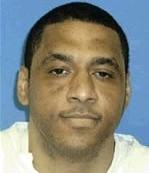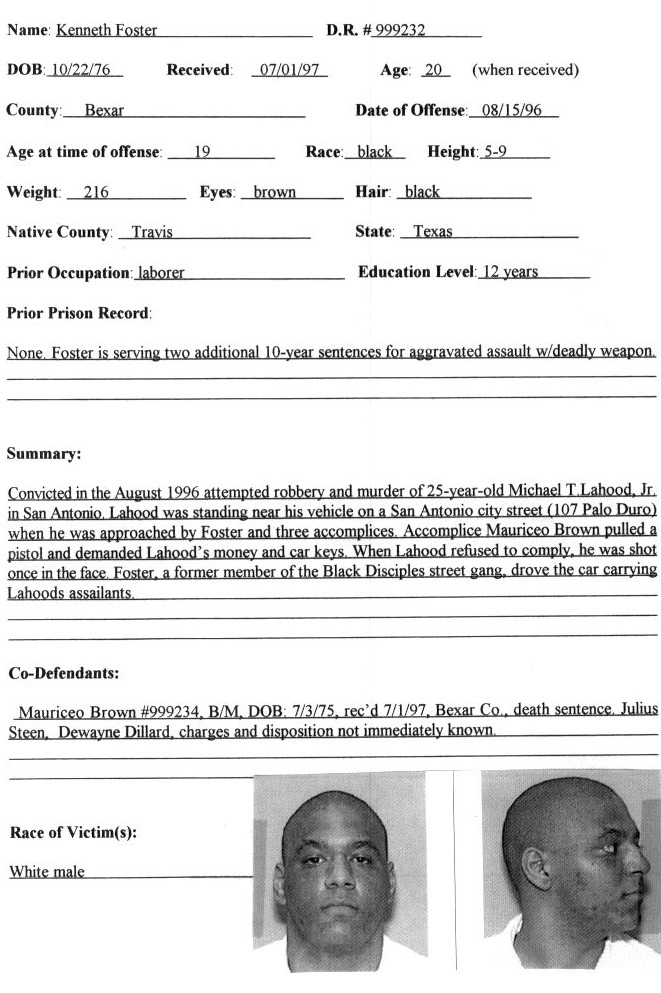AUSTIN – Gov. Rick Perry blocked the execution of death row inmate
Kenneth Foster and reduced his sentence to life in prison Thursday
after weeks of statewide protest and controversy over the law used to
convict him.
The unusual intervention
came just after the Texas Board of Pardons and Paroles voted, 6-1, to
recommend that the sentence be commuted, which is also rare. It's the
first time in nearly seven years in office that Mr. Perry has stopped
an execution, other than in response to Supreme Court rulings that
barred the execution of juveniles and the mentally retarded.
Mr. Foster, the getaway
driver in a 1996 armed robbery spree that ended in the murder of a 25-year-old
San Antonio man, was scheduled to die Thursday evening. He was not the
trigger man in the killing and contends he didn't know it was going to
happen. But he was convicted, in the same courtroom and at the same
time as the shooter, under the state's "law of parties," which
authorizes capital punishment for accomplices who either intended to
kill or "should have anticipated" a murder.
That law has drawn
international protests, but Mr. Perry indicated he was more concerned
about the simultaneous trials.
"It is an issue I think
the Legislature should examine," the governor said in a written
statement.
Mr. Foster, 30, will be
eligible for parole in 30 years.
Mr. Foster's family and
supporters, gathered in Huntsville for the possible execution, were
jubilant.
"We're all a little numb –
it's almost disbelief," said Dana Cloud, a spokeswoman for the Save
Kenneth Foster campaign. "It is a historic turning point for Kenneth.
But it's also a historic turning point in Texas, and indeed, with
regard to death penalty in general."
But the news was
heartbreaking to Nico LaHood, who found his older brother, Michael
LaHood, shot through the eye in their driveway on that summer night in
1996.
"It's not justice," he
said. "I don't think an independent jury's verdict should be
questioned."
Officials at the Bexar
County district attorney's office, which prosecuted the case against
Mr. Foster, did not comment on the commutation. But in an interview
last week, First Assistant District Attorney Cliff Herberg said Mr.
Foster is as guilty as if he fired the gun himself.
The Foster decision was
the governor's highest-profile death sentence ruling since 2004, when
he rejected a 5-1 recommendation of clemency for Kelsey Patterson, an
inmate with a long history of mental illness. Mr. Perry has been a
staunch advocate of Texas' death penalty, in the face of international
mockery and pressure to curb executions at the country's busiest death
row. Texas has executed more than 400 people since resuming capital
punishment in 1982.
Joint-trial issue
House Corrections
Committee Chairman Jerry Madden said he expects "a lot of hearings, a
lot of information provided" for lawmakers on the joint-trial issue
when they next meet in 2009. But the law of parties, he said, is
probably here to stay.
"That's been in effect for
a long time," said Mr. Madden, R-Richardson.
Sen. Rodney Ellis, a
Houston Democrat who has actively pushed for death penalty reform,
said he may try to pass legislation on both issues.
"Someone facing the
possibility of the death penalty at the very least deserves their own
fair and separate trial," Mr. Ellis said.
About 80 Texas death row
inmates were convicted under the law of parties, and about 20 of those
have been put to death. Most states have such laws for many types of
crimes, but Texas is the only state to apply it broadly to capital
cases. While death penalty opponents decry its use, prosecutors argue
that all those responsible for heinous crimes must be held accountable.
Given the amount of
attention paid to the law of parties throughout Mr. Foster's appeals,
"it's hard to imagine this not sparking more conversation," said Rob
Owen, a law professor and co-director of the Capital Punishment Clinic
at the University of Texas. Mr. Owen said he believes the problem is
not with the law itself, but with how Texas carries it over into
sentencing.
Mr. Foster acknowledges he
was up for getting high and robbing a few people on that night 11
years ago. But he was in a car with two other men nearly 90 feet away
when one of his partners shot and killed Mr. LaHood in what jurors
determined was a botched robbery.
The men in the car,
including Mr. Foster, have testified that they thought they were
finished robbing for the night and that there was no plan to stick up
– and certainly not to murder – Mr. LaHood. The shooter, Mauriceo
Brown, was executed last year.
Mr. Foster's attorney has
said he believes his client's fate was sealed during his joint trial
with Mr. Brown, when one of his robbing partners testified that "it
was kind of ... understood what was probably fixing to go down" when
Mr. Brown got out of the car.
It was enough for jurors –
and later, the appeals court – to support a capital murder charge for
Mr. Foster on the basis of conspiracy. They believed Mr. Foster, as
the getaway driver in two previous robberies, either knew what was
about to occur or should have anticipated it.
But Mr. Foster's attorney
never got the chance to cross-examine the two other partners, who both
received life sentences. One has since given a sworn statement to Mr.
Foster's attorney saying he didn't understand that Mr. Brown's intent
was to rob Mr. LaHood until Mr. Brown had already made his way up the
driveway. The other has testified that Mr. Foster asked the men all
night to quit and worried about returning the car to his grandfather.
The Texas Court of
Criminal Appeals, the state's highest criminal court, upheld Mr.
Foster's sentence for a final time this month. The governor, as the
last line of defense in Texas death row cases, has the authority to
reduce a death sentence to a life sentence with the written
recommendation of a majority of members of the Board of Pardons and
Paroles. The seven-member panel did not give a reason for its
recommendation.
Resigned to his fate
In an interview on death
row in Livingston last week, Mr. Foster appeared calm and resigned to
his fate – but vowed he wouldn't be an "active participant" in his
execution. He had stopped eating in protest, he said, and was
distracting himself with books, letters and silent prayers that Mr.
Perry would take his case seriously.
"I know a lot of eyes are
on me right now," Mr. Foster said. "I just feel like I'm in a plane,
and the engines went out, and all I've got is a parachute that won't
open."
At a rally outside the
Governor's Mansion on Thursday night, Keith Hampton, Mr. Foster's
attorney, said his client has a long road ahead of him and that he's
not confident he'll ever be paroled. But he said he expects Mr. Foster
to be moved to more comfortable confines promptly – perhaps somewhere
he can earn a college degree.
"People should not
underestimate the hardship of a life in prison," said Mr. Hampton, who
spent much of this week "a total basket case."
"He will find a way to
contribute," he said, "to the prison world and the free world."
Don't execute Kenneth E. Foster!
To: Rick Perry, Governor of Texas; the Texas Board of Pardons
and Paroles
We are turning to you because we are deeply
concerned about Mr. Kenneth E. Foster, a death row inmate at
Polunsky Unit in Livingston, who has an execution date on August 30,
2007.
We feel deep sympathy for the family of victim
Michael LaHood. Their loss is tremendous. However we do not believe
that taking the life of Kenneth Foster will ease the LaHood family’s
pain and suffering. Mauriceo Brown, the man who shot Michael LaHood,
is dead already. He was executed for this crime last year. The
execution of Kenneth Foster - who was convicted after the law of
parties - would be an unnecessary act of violence that does not
serve justice but only vengeance.
Kenneth Foster grew up in poverty, both his
parents were drug addicts and often in jail. When later living with
his grand-parents the harm the horrible family background caused on
him was irreversible. He went to high school and graduated in 1995,
but at the same time surrounded himself with the wrong crowd.
On the night of August 14th, 1996 Kenneth Foster
was together with three other young men: Mauriceo Brown, Julius
Steen, and Dwayne Dillard. He was driving a car rented by his
grandfather. During the night they committed two robberies.
According to Dillard, the role of 19-years old Kenneth Foster was
“just to drive”. Dillard also testified that Foster had told him
that he wanted to stop committing the robberies: “He told me that he
wanted to stop and he felt like if he told me that I would tell them
and that they would listen to me.”
Foster was driving through a residential area;
they stopped as a woman was waving her arms in the air as if to flag
them down for assistance. As Foster began to pull away, Brown got
out of the car and grabbed the gun. Dillard testified that Foster
could not have seen Brown taking gun because it was dark and Brown
and Dillard were in the back seat. Foster, Dillard, and Steen
remained in the car. When Brown walked toward the woman, her
boyfriend, Michael LaHood, approached from the driveway. Brown
inexplicably shot and killed LaHood.
All four men gave the same account regarding
Kenneth Foster’s alleged liability for Brown’s murder of LaHood:
Brown acted on his own independent impulse, no robbery was
contemplated by Foster, and Foster did not anticipate and could not
have anticipated Brown’s action.
Not participating in the first robberies, not
agreeing to rob Michael LaHood, not knowing why Brown left the car,
and not knowing that Brown had the gun, Kenneth Foster can’t be
guilty of capital murder after the law of parties. The US Supreme
Court ruled in Enmund vs. Florida that it violates the constitution
to sentence someone to death who did not himself kill, attempt to
kill, or intend to kill. The only exception to this rule is - Tison
vs. Arizona - if someone has a major personal involvement in the
crime and displays a reckless indifference to human life.
Kenneth Foster took nobody’s life, did not intent
to kill nor had a major personal involvement in the murder of
Michael LaHood. His wrongdoing confines to driving Brown, Steen and
Dillard around while they committed criminal acts. One can reproach
Foster with allowing them to use his car and him as a driver, one
can reproach him with not stopping the two robberies of that night.
However no-one can reproach him for not preventing the murder of
Michael LaHood, because he had no idea that Brown planned another
robbery, let alone a murder.
If considering the events of this night as a
whole and the role Kenneth Foster played within these events, you
will come to the conclusion that his execution would be completely
disproportionate to his guilt. What we ask you for is to take a deep
look into the case of Kenneth Foster and especially in the
testimonies of Julius Steen and Dwayne Dillard. We are asking you to
grant Mr. Foster a stay of execution and give him a chance for a
punishment measured by his liability.
Sincerely,
Petitiononline.com


